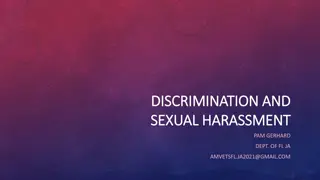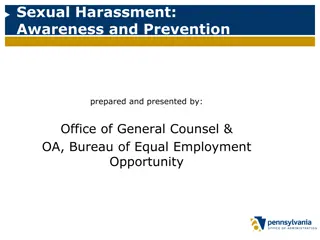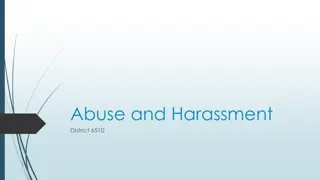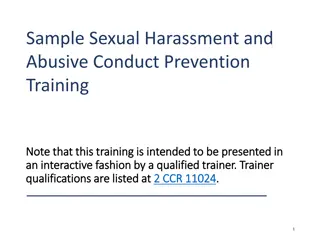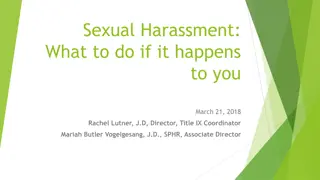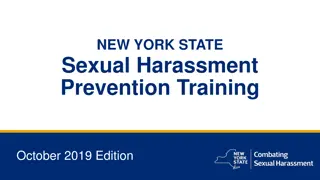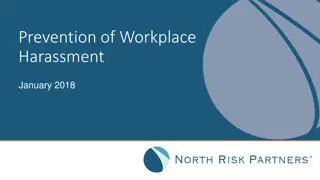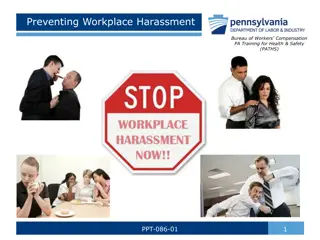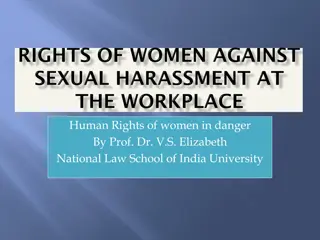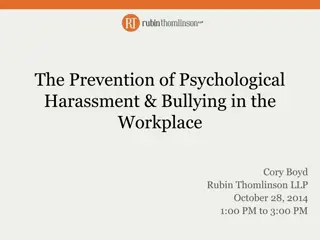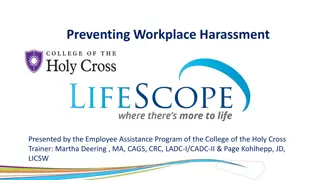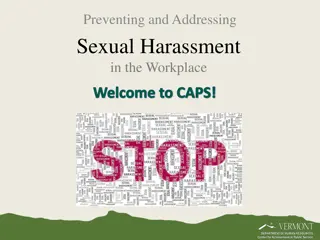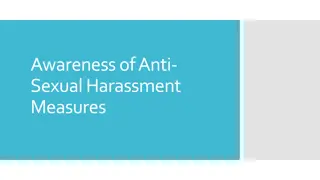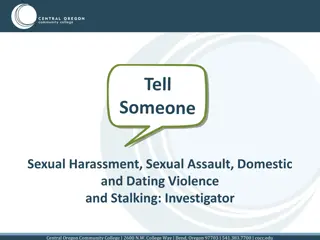Sexual Harassment Prevention Training Policy Overview
This document outlines a comprehensive sexual harassment prevention policy in compliance with the Illinois Human Rights Act and State Officials and Employee Ethics Act. It covers the prohibition of sexual harassment, responsibilities of the municipality as an employer, defining sexual harassment, and various types of conduct that may constitute sexual harassment. The policy emphasizes creating a work environment free from harassment and outlines steps to prevent, investigate, and remedy incidents of sexual harassment.
Download Presentation

Please find below an Image/Link to download the presentation.
The content on the website is provided AS IS for your information and personal use only. It may not be sold, licensed, or shared on other websites without obtaining consent from the author. Download presentation by click this link. If you encounter any issues during the download, it is possible that the publisher has removed the file from their server.
E N D
Presentation Transcript
Sexual Harassment Prevention Annual Training In compliance with the Illinois Human Rights Act & State Officials and Employee Ethics Act Based on the Illinois Municipal League Model Policy Prohibiting Sexual Harassment December 2020
Prohibition of Sexual Harassment Prohibition of Sexual Harassment All persons have a right to work in an environment free from sexual harassment. The Policy Prohibiting Sexual Harassment prohibits harassment of any person by any municipal official, municipal agent, municipal employee or municipal agency or office. Sexual Harassment is prohibited by Title VII of the U.S. Civil Rights Act and the Illinois Human Rights Act. 2
Responsibility of the Municipality as an Employer Responsibility of the Municipality as an Employer Through this policy and in compliance with state and federal law, the municipality will take action to prevent sexual harassment through training and appropriate oversight, investigate incidents of sexual harassment in the workplace consistent with its obligations, and take action to correct and remedy incidents of sexual harassment in the workplace. 3
Sexual Harassment is Defined as: Any unwelcome sexual advances or requests for sexual favors or any conduct of a sexual nature when: Submission to such conduct is made a term or condition of an individual s employment, either explicitly or implicitly; Submission to or rejection of such conduct by an individual is used as the basis for employment decisions affecting such individual; or Such conduct has the purpose or effect of substantially interfering with an individual s work performance or creating an intimidating, hostile or offensive working environment. 4
Conduct Which May Constitute Sexual Harassment Includes, but Is Not Limited to: Verbal Harassment: sexual innuendos, suggestive comments, insults, humor, and jokes about: sex, anatomy or gender-specific traits, sexual propositions, threats, repeated requests for dates; or, statements of a sexual nature about other employees, even outside of their presence. Non-verbal Harassment: suggestive or insulting sounds (whistling), leering, obscene gestures, sexually suggestive bodily gestures, catcalls, smacking or kissing noises. Visual Harassment: posters, signs, pin-ups or slogans of a sexual nature, viewing pornographic material or websites. 5
Conduct Which May Constitute Sexual Harassment Includes, but Is Not Limited to: Physical Harassment: touching, unwelcome hugging or kissing, pinching, brushing the body, any coerced sexual act or actual assault. Textual/Electronic Harassment: sexting (electronically sending messages with sexual content, including pictures and video), the use of sexually explicit language, harassment, cyber stalking and threats via all forms of electronic communication (email/text/picture/video messages, intranet/online postings, blogs, instant messages and posts on social network websites, like Facebook and Twitter). 6
Procedure for Reporting an Allegation of Sexual Harassment If you are harassed or observe another employee or official being harassed: If it is safe to do so, tell the offending individual directly that the conduct is unwelcome and request that it stop. Report the conduct to your direct supervisor or other responsible official. Reporting the behavior to your direct supervisor or other responsible official is the only way to ensure the municipality has notice of the event and can take appropriate action. 7
Procedure for Reporting an Allegation of Sexual Harassment If your direct supervisor or other responsible official is not available or is the perpetrator, you may report any allegation of harassment to a department head, the human resources director, an ethics officer or your municipality s chief administrative or chief elected official. You may also report incidents of harassment to the Illinois Department of Human Rights (IDHR) or the Equal Employment Opportunity Commission (EEOC). Your complaints to IDHR or EEOC are required to be filed within 300 days of the incident. 8
Procedure for Reporting an Allegation of Sexual Harassment Documentation of incidents of sexual harassment may be submitted. Include the date, time and location, together with the identity of any witnesses or evidence of the event. All allegations of sexual harassment will be accepted and investigated by appropriate staff or consultants. A person experiencing sexual harassment should consider their cooperation in any investigation a vital component of an effective inquiry resulting in an appropriate outcome. 9
Procedure for Reporting an Allegation of Sexual Harassment Complaints of Sexual Harassment of an Elected Official By Another Elected Official Public Act (P.A.) 101-0221 amended the State Officials and Employees Ethics Act to require municipalities to provide for the independent review of complaints of sexual harassment of an elected official by another elected official. At the request of an elected official, the municipality must retain an experienced outside consultant to receive complaints of sexual harassment of an elected official by another elected official and independently review those complaints. When completed, that review will be provided to the corporate authorities of the municipality for appropriate action under the Policy Prohibiting Sexual Harassment. Elected officials may also report allegations of sexual harassment to the municipality s chief administrative or chief elected official. 10
Procedure for Reporting an Allegation of Sexual Harassment to IDHR If you or someone you know has experienced or witnessed unwelcome conduct of a sexual nature in the workplace, please call the State of Illinois Sexual Harassment and Discrimination Helpline for assistance. Calls are confidential and can be made anonymously. Call: 1-877-236-7703 Visit: www.Illinois.gov/SexualHarassment Helpline representatives can help callers navigate their numerous reporting options and share additional information related to counseling, legal assistance and frequently asked questions. From IDHR Sexual Harassment Prevention Training Program April 2020 11
Procedure for Reporting an Allegation of Sexual Harassment to EEOC To file a charge, call or visit online: 1-800-669-4000 | www.EEOC.GOV 1-800-669-6820 (TTY for Deaf/Hard of Hearing callers only) 1-844-234-5122 (ASL Video Phone for Deaf/Hard of Hearing callers only) EEOC Offices Serving Illinois Chicago District Office. John C. Kluczynski Federal Building, 230 South Dearborn Street, Chicago, IL 60604 St. Louis District Office. Robert A. Young Federal Building, 1222 Spruce Street, Room 8.100, St. Louis, MO 63103 From IDHR Sexual Harassment Prevention Training Program April 2020 12
Prohibition on Retaliation for Reporting Sexual Harassment The Policy Prohibiting Sexual Harassment prohibits any retaliation against any municipal employee or official for: Disclosure or threatened disclosure of any violation of this policy; or Providing information related to an investigation or testimony before any public body conducting an investigation, hearing or inquiry into any violation of this policy; or Assistance with or participation in a proceeding to enforce the provisions of this policy. 13
Prohibition on Retaliation for Reporting Sexual Harassment Retaliation is defined as: the reprimand, discharge, suspension, demotion, denial of promotion or transfer, or change in the terms or conditions of employment of any municipal employee that is taken as a result of a municipal employee s or official s involvement in protected activity pursuant to this policy. No individual making a report will be retaliated against, even if a report made in good faith is not substantiated. Any witness to an incident of sexual harassment will be protected from retaliation. 14
Prohibition on Retaliation for Reporting Sexual Harassment Reporting sexual harassment is protected by the Policy Prohibiting Sexual Harassment and is further protected by: The State Officials and Employees Ethics Act (5 ILCS 430/15-10); The Whistleblower Act (740 ILCS 174/15(a)); and, The Illinois Human Rights Act (775 ILCS 5/6-101). 15
Consequences of Committing Sexual Harassment Violations of the Policy Prohibiting Sexual Harassment may subject the violator to fines of up to $5,000 per offense (5 ILCS 530/50-5(c)), in addition to any disciplinary actions imposed pursuant to the employment policies, rules and regulations of the municipality, and/or remedies and penalties that may apply under other local ordinances, state or federal law. 16
Consequences for Knowingly Making a False Report of Sexual Harassment A report of sexual harassment made in good faith, which cannot be proven, is not a false report. A false report is a report of sexual harassment made by an accuser to accomplish an outcome other than stopping sexual harassment or stopping retaliation for reporting sexual harassment. A person intentionally making a false report of sexual harassment may be subject to disciplinary action or discharge pursuant to the employment policies, rules and regulations of the municipality. 17
Remedies Available Under the Illinois Human Right Act After IDHR completes its investigation, the complainant: 1. May file a lawsuit in civil court; or 2. May file a complaint with the Illinois Human Rights Commission (IHRC) if IDHR found substantial evidence of a violation. Complainants who prevail with the IHRC or a civil court may receive an order awarding remedies allowed by the Illinois Human Rights Act to make the complainant whole. Remedies may include: back pay, lost benefits, clearing of a personnel file, monetary damages, hiring, promotion, reinstatement, front pay and attorney s fees and costs. From IDHR Sexual Harassment Prevention Training Program April 2020 18
Remedies Available Under Title VII of the U.S. Civil Rights Act of 1964 After EEOC completes its investigation: 1. The complainant may file a lawsuit in federal court. 2. EEOC may help parties reach a settlement through an informal process called conciliation if EEOC finds reasonable cause to believe discrimination occurred. Complainants who prevail in federal court may receive an order awarding remedies allowed by Title VII to make the employee whole. Remedies may include: back pay, lost benefits, clearing of a personnel file, monetary damages, hiring, promotion, reinstatement, front pay, punitive damages and attorney s fees and costs. From IDHR Sexual Harassment Prevention Training Program April 2020 19
IML has provided these training materials for the members. The municipality has customized the materials. The training material has been reviewed for accuracy and consistency with present law, local ordinances and municipal policies. 20
Acknowledgement By signing below, I acknowledge that I have received a copy of the City of Du Quoin s Policy Prohibiting Sexual Harassment and understand that it is my responsibility to read and become familiar with its contents. I further understand that it is my responsibility to ask questions of my supervisor and/or other responsible official if I do not understand any of the information contained in the Policy and that I am required to abide by and observe all of the information, rules, policies and procedures explained therein. I acknowledge that nothing in the Policy constitutes a contract or promise of employment. I agree to abide by and observe all of the information, rules, policies, and procedures set forth in the Policy and understand that the City of Du Quoin s rules, policies and procedures may be changed from time to time, with or without notice, and that this Policy supersedes and replaces any and all prior manuals or policies. I further certify that I have carefully read and reviewed the content of the Policy and completed Sexual Harassment Prevention Training pursuant to the Illinois Human Rights Act, 775 ILCS 5/2-109. Training Participant Information: Click to print the acknowledgement page for signature. Then click ESC to exit slideshow _______________________________________________ Printed Name - First, Middle Initial, Last _______________________________________________ Municipality/Work Location ______________________ Training Date _______________________________________________ Signature _______________________ Date Signed This form will be kept by the City of Du Quoin as an internal record of training compliance to be made available for the Illinois Department of Human Rights upon request. 21






